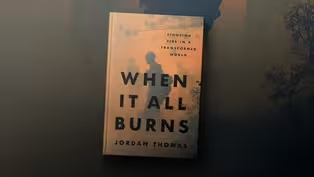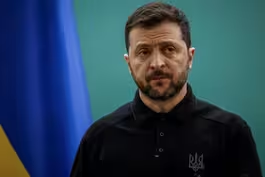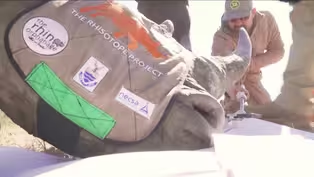
What Pawol’s MLB debut means for the future of women umpires
Clip: 8/9/2025 | 5m 31sVideo has Closed Captions
What Jen Pawol’s debut means for the future of women umpires in Major League Baseball
Saturday in Atlanta, Jen Pawol took the field as the first woman to umpire a regular-season game in Major League Baseball’s nearly 150-year history. She was on the bases this afternoon for both games of a doubleheader between the Miami Marlins and Atlanta Braves. John Yang speaks with The Washington Post’s national baseball writer Chelsea Janes for more.
Problems playing video? | Closed Captioning Feedback
Problems playing video? | Closed Captioning Feedback
Major corporate funding for the PBS News Hour is provided by BDO, BNSF, Consumer Cellular, American Cruise Lines, and Raymond James. Funding for the PBS NewsHour Weekend is provided by...

What Pawol’s MLB debut means for the future of women umpires
Clip: 8/9/2025 | 5m 31sVideo has Closed Captions
Saturday in Atlanta, Jen Pawol took the field as the first woman to umpire a regular-season game in Major League Baseball’s nearly 150-year history. She was on the bases this afternoon for both games of a doubleheader between the Miami Marlins and Atlanta Braves. John Yang speaks with The Washington Post’s national baseball writer Chelsea Janes for more.
Problems playing video? | Closed Captioning Feedback
How to Watch PBS News Hour
PBS News Hour is available to stream on pbs.org and the free PBS App, available on iPhone, Apple TV, Android TV, Android smartphones, Amazon Fire TV, Amazon Fire Tablet, Roku, Samsung Smart TV, and Vizio.
Providing Support for PBS.org
Learn Moreabout PBS online sponsorshipJOHN YANG: History was made in Atlanta this afternoon when Jen Pawol took the field as the first woman to umpire a regular season game in Major League Baseball's nearly 150 year history.
She was on the basis for both games of a double header between the Miami Marlins and the Atlanta Braves.
In tomorrow's game, she's going to behind the plate calling balls and strikes.
Earlier, I spoke with Chelsea Janes, The Washington Post national baseball writer.
I asked her how Pawol found out she'd be working today's games.
CHELSEA JANES, The Washington Post: She said she was in her hotel room in Nashville and got called to a conference call with two MLB officials who were in charge of umpiring.
And they told her, you know, this is your moment.
And she called her crew chief, so the guy who's in charge this weekend, and they started yelling over the phone.
You know, a grown man who generally has to kind of maintain decorum on a baseball field, just kind of screaming into the phone with her, which is just really kind of special to hear about.
JOHN YANG: Tell me a little bit about her background.
How did she become interested in umpiring?
CHELSEA JANES: Jen played college softball.
She wanted to umpire from the day she first tried it, even in high school, like as a throwaway side job.
And when she got done playing, she kind of looked into it, umpired high school baseball in upstate New York, even umpired college softball in New England and New York.
So she was pretty much at the highest level she could get to for that and wanted more, wanted it to be a career instead of something she got paid a couple hundred bucks a weekend to do.
So she, you know, ended up hearing about a clinic.
And at a clinic, she met a major league umpire named Ted Barrett.
And he said, hey, you're pretty good at this.
I also host a clinic down in Atlanta.
She attended it and was funneled into the minor league system from there.
JOHN YANG: Talk about how that works, how umpires work their way through the minor league system.
CHELSEA JANES: It used to be the kind of thing you had to sort of buy your way into these schools and prove yourself and Major League Baseball said that's.
That's eliminating too many people.
So they started hosting more open clinics that you could sign up for and learn, and they would evaluate you there.
That's what Jen did.
And she kept passing the test level by level.
And a few years ago, she got promoted to AAA, which is the highest minor league level.
She not only got promoted there, but she was given the championship game because she did so well.
And, you know, after that, sort of got on the short list to make it to major league spring training, and this year, finally gotten this pool of umpires where if they need someone to fill in like they did this weekend, they could choose her, and they did.
So she's not full time in the big leagues yet.
Those jobs do not come open very often.
People cling to them as you would think they would, but when one opens, she's close.
JOHN YANG: You mentioned Ted Barrett, you mentioned her crew chief today.
Has she gotten a lot of support from both former and current umpires?
CHELSEA JANES: She really has, and I think it's fair to wonder if that was going to be the case.
You know, this is something that.
It's very different, and it's a role where you're not used to seeing women.
And, you know, even I - - when I first heard about this, I was like, well, the players yell at her more.
Will they yell at her less?
Will they take her seriously?
But, you know, I think once you see her handle this, you kind of understand, oh, she handles herself in a way where you really don't notice until you think about it.
And I think that's what those umpires saw too.
JOHN YANG: You know, you pointed out in your story in The Post that Major League Baseball almost had a robo calling balls and strikes before they had a woman calling balls and strikes.
How does baseball compare with the other professional sports in this sense?
CHELSEA JANES: They're a little behind.
The NBA had female referees in the late 90s.
The NFL had them about a decade ago, I believe.
The NHL still hasn't had one.
I think that the general consensus is part of that is the breaking up fights part is a little bit tricky.
Baseball was behind.
She's been in the pipeline for a long time, and now there are more women there.
But, yeah, they've tested automatic balls and strikes, and they're going to introduce them on a limited basis.
But, yeah, they got farther with that more quickly than they did with women.
And, you know, I don't think that's too surprising.
JOHN YANG: Talk about that pipeline.
Are there more women coming up there?
CHELSEA JANES: Are there are, I believe, six umpires in the minor leagues right now.
I believe that's counting Jen Pawol.
They're being vetted the same way that Jen was and that the male umpires are.
You probably won't see them at these levels for quite some time.
It just takes a while.
But yeah, there's more women following in her footsteps, and I think there's reason to believe that we'll see more of them in the big league soon.
JOHN YANG: In the past, a woman had come close to making the majors.
Is that right?
CHELEA JANES: Pam Postima came really close in the late 80s and just didn't find a league that was receptive to her.
She's been in touch with Jen Pawol throughout this process, and Jen said that when she got promoted to AAA a little over a year ago, she went to dinner with Pam and the last thing Pam said to her was, get it done.
You know, get it done.
And so when she got the call this week, you know, Jen said she texted her, you know, I'm getting it done.
JOHN YANG: You talked about how the umpires saw what she does and have supported her.
Any sense of the minor leagues, of what the players have reacted?
CHELSEA JANES: She shared a story about one third baseman who heard the news this week and said, hey, we've done this at every level and I'll see you in the big leagues, you know, and I think they respect it.
I've only seen people be really polite and go over and fist bumper like they do everyone else.
But I think people also, a little bit, even have their eye on her, like, hey, you know, go do this and.
And so I think it's been kind of a really pleasant surprise to see the support she's gotten.
JOHN YANG: Chelsea Janes of the Washington Post, thank you very much.
CHELEA JONES: Thanks for having me.
New book recounts megafire season with Los Padres Hotshots
Video has Closed Captions
Clip: 8/9/2025 | 5m 33s | ‘When It All Burns’ recounts a historic megafire season with the elite Los Padres Hotshots (5m 33s)
News Wrap: Zelenskyy says Ukraine won’t cede land to Russia
Video has Closed Captions
Clip: 8/9/2025 | 2m 37s | News Wrap: Zelenskyy says Ukraine won’t give up territory to end war with Russia (2m 37s)
Scientists make rhino horns radioactive to fight poachers
Video has Closed Captions
Clip: 8/9/2025 | 2m 9s | How radioactive rhino horns could help save the species from poachers (2m 9s)
Study highlights ‘grave’ health dangers of plastic pollution
Video has Closed Captions
Clip: 8/9/2025 | 4m 48s | New study highlights ‘grave, growing’ danger of plastic pollution to world’s health (4m 48s)
Providing Support for PBS.org
Learn Moreabout PBS online sponsorshipSupport for PBS provided by:
Major corporate funding for the PBS News Hour is provided by BDO, BNSF, Consumer Cellular, American Cruise Lines, and Raymond James. Funding for the PBS NewsHour Weekend is provided by...















